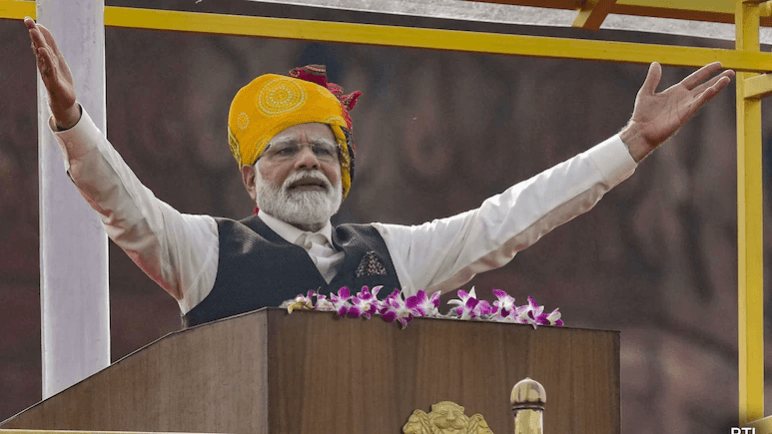
Prime Minister Narendra Modi has reached a significant milestone in Indian political history by surpassing Indira Gandhi's uninterrupted tenure, becoming the second-longest-serving Prime Minister of India. As of July 25, 2025, PM Modi has completed 4,078 days in office, marking an eleven-year journey characterized by transformative changes across various sectors, including the economy, infrastructure, diplomacy, and social welfare. His rise as a defining political figure of the post-Independence generation is particularly noteworthy, as he is the first Prime Minister born after 1947 and the longest-serving leader from a non-Hindi-speaking state.
PM Modi's journey began with a dramatic electoral victory in 2014, where he initiated sweeping changes with a mandate focused on governance reform and economic development. One of the most significant reforms under his leadership was the rollout of the Goods and Services Tax (GST) in 2017. This reform marked a historic restructuring of India's tax architecture, replacing a fragmented system with a unified framework aimed at streamlining business across state lines. Alongside this reform, there was a strong emphasis on domestic production. Campaigns such as "Make in India" and "Atmanirbhar Bharat" were launched to bolster manufacturing, reduce dependence on imports, and create a self-reliant economic model.
‘Chai Pe Charcha’ with PM Keir Starmer at Chequers...brewing stronger India-UK ties! @Keir_Starmer pic.twitter.com/sY1OZFa6gL
— Narendra Modi (@narendramodi) July 24, 2025
Digital governance has been another area where PM Modi has left a lasting impact. Under his leadership, the Digital India initiative reimagined the relationship between citizens and the state, bringing services online and increasing transparency. Platforms like the Unified Payments Interface (UPI) revolutionized payment systems, enabling billions of transactions and placing India at the forefront of financial technology. The "Jan Dhan Yojana" further expanded access to banking, drawing millions of previously unbanked individuals into the formal financial ecosystem. These measures brought fiscal empowerment to the grassroots and laid the groundwork for direct benefit transfers that minimized leakages in welfare schemes.
A Historic Milestone for Prime Minister @narendramodi ??
— BJP (@BJP4India) July 25, 2025
?️ On 25th July 2025, PM Narendra Modi will complete 4,078 consecutive days in office, officially becoming the second longest-serving Prime Minister in India’s history, surpassing Indira Gandhi (4,077 days from 1966 to… pic.twitter.com/qjczL9assQ
Infrastructure and Defense Initiatives
Infrastructure development has been a hallmark of PM Modi's tenure. Road construction tripled in pace, and flagship initiatives like "Bharatmala" and "Sagarmala" pushed connectivity to the forefront of the development agenda. Air travel was made more accessible through the UDAN scheme, and rail modernization arrived in the form of Vande Bharat trains, symbolizing speed, efficiency, and Indian innovation. These initiatives have significantly improved the country's infrastructure, making transportation more efficient and accessible.
In the realm of defense and national security, PM Modi presided over a more assertive and globally visible India. Whether it was the retaliatory strikes in Uri and Balakot or the revamping of defense procurement and exports, his government shifted the narrative from strategic restraint to proactive engagement. The "Agnipath" Scheme exemplifies this new posture, aimed at recalibrating military recruitment towards younger, agile cadres. This approach has strengthened India's defense capabilities and enhanced its global standing.
Social welfare saw significant expansion under PM Modi's leadership. Ayushman Bharat offered health coverage to over 55 crore people, and the Pradhan Mantri Awas Yojana delivered millions of homes to rural and urban beneficiaries. The Ujjwala Yojana provided clean cooking fuel to households long dependent on polluting biomass, reducing health hazards and empowering women in domestic spaces. These initiatives have improved the quality of life for millions of Indians, particularly in rural areas.
Global Diplomacy and Leadership
On the global front, PM Modi's foreign policy emphasized strategic autonomy, regional leadership, and global stature. India hosted the G20 summit in 2023, enhancing its profile as a key player in global governance. His diplomatic engagements in the UK and Maldives illustrate continued outreach and negotiation, reinforcing India's evolving role in the Indo-Pacific and beyond. These efforts have positioned India as a significant player on the world stage, capable of influencing global policies and decisions.
PM Modi's tenure reflects an ambitious re-engineering of governance and national priorities, framed by centralization of power and charismatic leadership. His success in leading six consecutive election victories—three each as Gujarat Chief Minister and Prime Minister—cements him as a rare political figure whose electoral performance matches administrative longevity. While debates around institutional checks and democratic transparency continue, his 11 years in office mark a decisive chapter in India's post-liberalization story, one shaped by bold decisions, massive public engagement, and an enduring resonance with a broad electoral base.
Historically, PM Modi's tenure can be compared to other long-serving leaders who have left a significant impact on their nations. For instance, Indira Gandhi, whom PM Modi has now surpassed in terms of uninterrupted tenure, was known for her centralization of power and significant policy decisions, such as the nationalization of banks and the Green Revolution. Similarly, PM Modi's tenure has been marked by centralization and transformative policies that have reshaped India's economic and social landscape.
In conclusion, PM Modi's eleven-year tenure as Prime Minister of India has been a period of significant transformation and development. His leadership has brought about sweeping changes in governance, economy, infrastructure, and social welfare, leaving a lasting impact on the nation. As India continues to navigate the challenges and opportunities of the 21st century, PM Modi's legacy will undoubtedly be a subject of study and debate for years to come.











